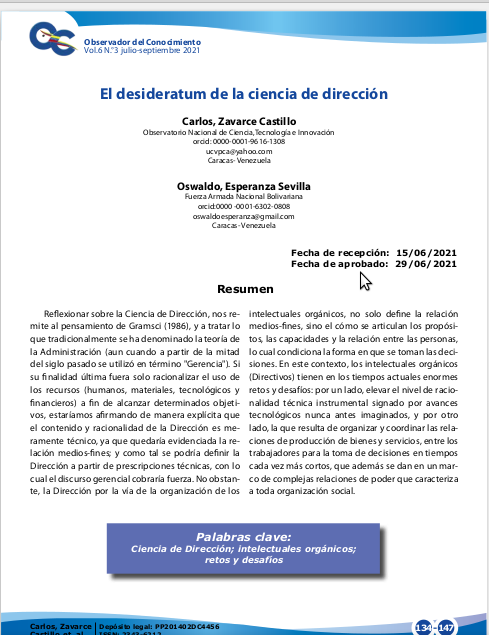The desideratum of management science
Keywords:
Science of direction, organic intellectuals, challengesAbstract
Reflecting on the Science of Direction refers us to the thought of Gramsci (1986) and to deal with what has traditionally been called the theory of Administration (even though from the middle of the last century, the term “Management” was used). If its ultimate purpose were to rationalize the use of resources (human, material, technological and financial) to achieve particular objectives, we would explicitly state that the content and rationale of direction are merely technical since the means-ends relationship would be evidenced. Therefore, the direction could be defined based on technical prescriptions, with which the managerial discourse would gain strength. However, through the organization of organic intellectuals, the direction defines the means-ends relationship and how the purposes, capabilities, and relationship between people are articulated, which conditions the way decisions are made. In this context, organic intellectuals (Executives) have enormous challenges. On the one hand, raise the level of instrumental technical rationality marked by rapid technological advances. On the other hand, organize and coordinate the relations of production of goods and services among workers for decision-making in increasingly shorter times, which also occurs in a framework of complex power relations that characterize all social organizations.
Downloads
References
Beer Stafford, (1972). Brain of the Firm. Second Edition. John Willey &Sons, INC. Centro de Estudio para el Desarrollo Integral (CESDI).
Cordova, V. ; Zavarce, C. (2009). Socialismo, Modos de Vida y Nuevas tecnologías de Información. Armada de Venezuela. Escuela Superior de Guerra Naval.
Ferraotti, F. (1991). La Historia y lo cotidiano. Centro Editor de América Latina, Buenos Aires.
Gramsci, A. (1986). Cuadernos de la cárcel. Vol. IV, México, Ediciones Era, p. 355.
Ludovick, V. (1995). Contextualizar lo Descontextualizado. Una Necesidad del Discurso Gerencial. Temas de Frontera en el campo de la Gerencia. Fondo Editorial Tropykos, Venezuela.
Maturana, H. (2004). El árbol del conocimiento: las bases biológicas entendimiento humano. Editorial Alianza, Argentina
Morin, E. (1994). Introducción al Pensamiento Complejo. Tierra-Patria, Barcelona, Kairós.
Nash, J. (1950). Non cooperative Games. Ph. D. Dissertation Princeton University.
Prigogine, I. (1997). El fin de las certidumbres. Editorial Andrés Bello. Chile.

Downloads
Published
How to Cite
Issue
Section
License

This work is licensed under a Creative Commons Attribution-NoDerivatives 4.0 International License.







